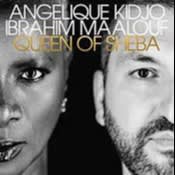
Around 30 centuries ago, the Queen of Sheba travelled to Jerusalem to visit King Solomon, bringing not only gifts of spices but also riddles designed to test his reputation as the wisest man in the world. In the Ethiopian text Kebra Nagast, the queen is called Makeda; in the Kabbalah, she is Queen of the Demons; Quranic commentators name her Bilqis; Josephus and, later, Boccaccio called her Nicaula; the Yoruba claim her as their own.
This meeting resonates through music, from Handel’s oratorio Solomon to the works of Gounod and Respighi. Now the Beninese singer Angélique Kidjo and the French-Lebanese trumpeter Ibrahim Maalouf — also a meeting of Africa and the Middle East — have constructed a concept album around the queen’s riddles. The project began as a stage show straddling the classical and popular worlds; Maalouf started as a classical composer and trumpeter and Kidjo has worked with, among others, Philip Glass. The lyrics, in Yoruba, update and modernise the riddles in ways that are uncompromising and uncomfortable.
Opener “Ahan” begins with baroque trumpet flourishes faintly recalling Handel, and then a hard ostinato as Kidjo demands, “Where does that power come from . . . what part of your body gives you this infinite power over men?” The hidden answer is the tongue, the power of words and language, which Kidjo’s Sheba turns back on the king. “I, black woman, am subservient before you/Oh, most powerful of white men/For I, supposedly, stole water from your fountain” — a nod to the Ethiopian version of the story, where the queen promises not to steal anything from Solomon and is then upbraided when she seeks to slake a night thirst: power and resource imbalances that could not be more contemporary.

The battle of wits continues on “Eyin”, the queen taunting Solomon with the question “do you want another sign?” as Maalouf’s trumpet huffs and buzzes furiously. In the sad, slow “Omije”, the trumpet weeps along with the vocals. “Ife” starts as a stark duet for voice and guitar before the orchestra swells and Maalouf takes off into airy cadenzas. The bouncy “Ogbo” is brighter, Kidjo’s tumble of syllables percussive and polyrhythmic before epic, anthemic choruses.
There is a marketplace bustle to “Alikama”, synth loops knitting under drums and trumpet. “I, Balkis, known as Makeda, too, I am the Queen of the South/And yet I am your prisoner,” sings Kidjo before the music declares a truce. It forms part of the negotiation running throughout the album, a complex tussle between oppression, patriarchy, repulsion and attraction.
★★★★☆
‘Queen of Sheba’ is released by Mister Ibé
Stay connected with us on social media platform for instant update click here to join our Twitter, & Facebook
We are now on Telegram. Click here to join our channel (@TechiUpdate) and stay updated with the latest Technology headlines.
For all the latest Art-Culture News Click Here
